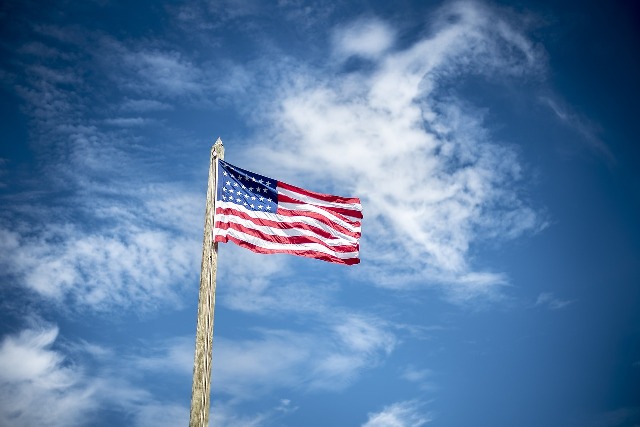“American” Is Meaningless

What does it mean to be an American?
If someone said, “I ran into an American today” how would you know what they mean? What would you know about this person they met based on this description? Would it tell you anything?
I would argue that “American” wouldn’t tell you anything about the person encountered. It wouldn’t tell you anything about their race, religion, worldview, values, culture, country of origin, the language or languages they speak, their national loyalties, their political ideology, their view of American history, or their hopes for America’s future.
I would argue that while words like “Japanese,” “Congolese,” “Thai,” or even “frog” or “rock” have specific meanings, the word “American” does not. It is without meaning or definition.
Any definition you attempted to give “American” would be exclusionary – as all definitions are – and offensive to someone.
There was once a time when there was broad consensus about what it meant to be an American. Founding Father and first Supreme Court Justice, John Jay said this:
With equal pleasure I have as often taken notice, that Providence has been pleased to give us this one connected country to one united people – a people descended from the same ancestors, speaking the same language, professing the same religion, attached to the same principles of government, very similar in their manners and customs, and who, by their joint counsels, arms, and efforts, fighting side by side throughout a long and bloody war, have nobly established general liberty and independence.
Jay describes an America with a very clear sense of self and a time when the word “American” had a clear and commonly understood definition.
Yet, as clear and commonly understood as this understanding of “American” was, it was also flawed. When Jay wrote these words roughly twenty percent of the population – or one out of every five people – living in the newly independent states did not meet this description of “American.” They were black – and 95% of them were slaves. Their reasons for coming to America were different. They had a different history, heritage, and culture – and sometimes a different language, religion, and principals of government. But representatives of this estranged group fought in every major battle for American independence.
Were they “American?” Answers are mixed – both then and now. They were allowed to and sometimes forced to fight for something they were excluded from – a product of a different people, history, and heritage.
Flawed as it was, the word “American” had a clear and common definition at its inception, while today, it is without meaning.
Why would a pastor write about this?
When a country of hundreds of millions of people has no uniting sense of self, common identity, history, values, worldview or purpose, there are only a few ways forward.
The lack of internal cohesion can be exploited in a thousand different ways by an external adversary like a hammer on cracked glass and the country can fall to conquest.
The country can balkanize into several or even dozens of pieces. This can either happen all at once, or incrementally as one area or region differentiates itself more and more from another until one day the separation that already exists in reality is made official.
The country and diverse people can be internally held together by a strong authoritarian government. This is by definition what empires do – they hold diverse groups of people or nations together against their will through force. The Pax Romana was not so much a Roman peace, but a Roman pacification – an order imposed and maintained through brutality and coercion.
There are forces driving all three of these in the United States right now – conquest, balkanization, and tyranny and it is too early to tell which one might take the lead and write the future – but there is a fourth and more hopeful way forward.
We could find our sense of common identity and strength through Christian revival. Christianity is the one, truly universal world religion, and has a demonstrated capacity to make “e pluribus unum” (out of many, one) a reality. It is also the foundation on which the best of what America is has been built.
The universal equality of human beings and the belief that all people have inherent God-given human rights are based on the belief that there is a divine moral lawgiver that we should all conform our behavior to and before whom all just laws are either validated or invalidated. These are all uniquely Christian theological beliefs.
Years ago, an atheist friend of mine who was a regular at one of my men’s Bible study breakfasts and held a high position on the United Nations Human Rights Counsel said one day that his job was mostly trying to impress Christian values onto non-Christian people with limited tools to do so.
Though not a believer in Jesus, he saw that Christianity created the types of societies that the majority of humans want to live in.
I believe that “Jesus is King” is the only thing that can provide the internal cohesion needed to hold a large and diverse population together. All definitions are divisive, but not having any definition for what it means to be an “American” will eventually become painfully destructive and end in chaos, conquest, balkanization, or tyranny unless we find another way. Jesus is that way.
The way out of disaster was handed to us long ago when God said, “if my people, who are called by my name, will humble themselves and pray and seek my face and turn from their wicked ways, then I will hear from heaven, and I will forgive their sin and will heal their land” (2 Chronicles 7:14).
Unfortunately I don’t see any indication at the moment that we will choose it – and we won’t be the first people to reject the hand offered us. But I pray.
“This is what the Sovereign Lord, the Holy One of Israel, says: “In repentance and rest is your salvation, in quietness and trust is your strength, but you would have none of it.” (Isaiah 30:15)
– – –
Other Things You Might Be Interested In:



No Comment